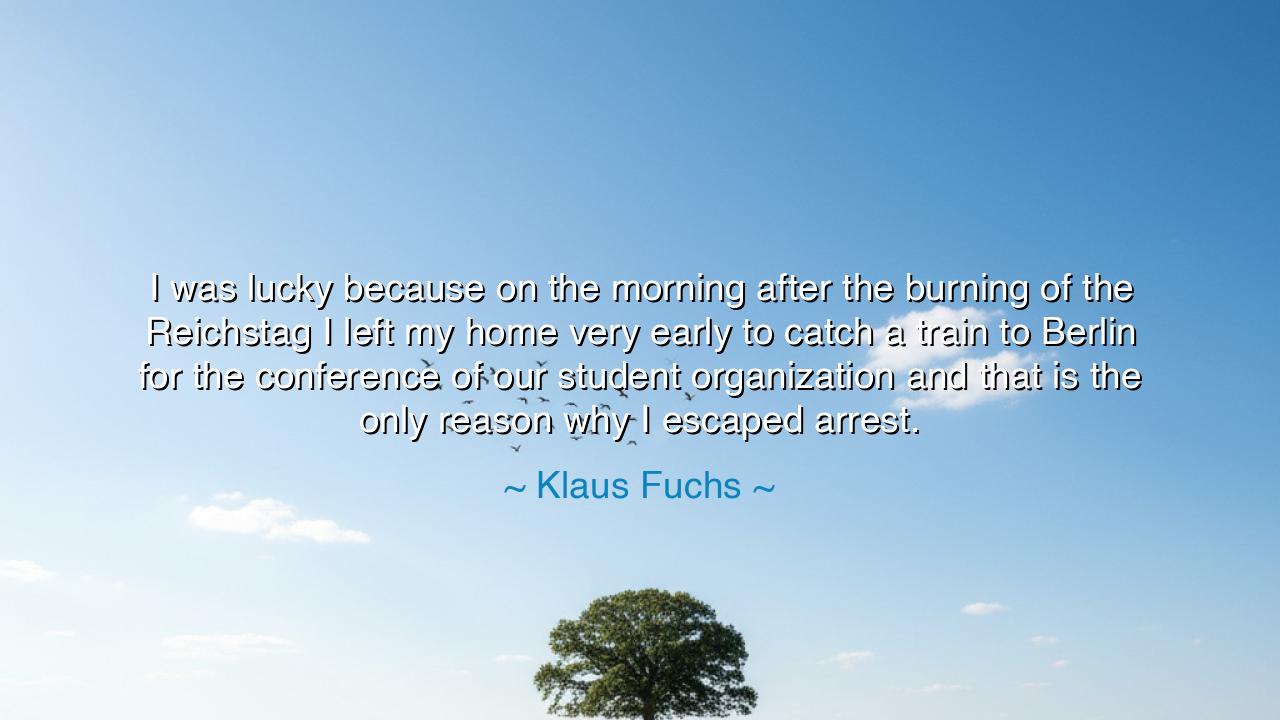
I was lucky because on the morning after the burning of the
I was lucky because on the morning after the burning of the Reichstag I left my home very early to catch a train to Berlin for the conference of our student organization and that is the only reason why I escaped arrest.






In the chronicles of peril and providence, a quiet sentence can carry the weight of a century: “I was lucky because on the morning after the burning of the Reichstag I left my home very early to catch a train to Berlin for the conference of our student organization, and that is the only reason why I escaped arrest.” So speaks Klaus Fuchs, and his words toll like a bell at dawn. They name the fragile hinge upon which a life, and sometimes a nation’s story, can turn: not strategy or strength, but the narrow mercy of timing. The saying is both confession and map—confession of vulnerability before a storm, map of the thin path by which one soul slipped between the teeth of history.
Hear the layers of meaning folded within. The burning of the Reichstag was not merely a fire; it was a signal flare for the machinery of fear, the pretext by which power refashioned law into a net. In such hours, “guilt” can be assigned by proximity, and innocence has little purchase. Fuchs does not boast of cunning; he invokes luck—a train caught at first light, a door closed behind him moments before the knock. Thus the line instructs us that survival in the shadow of tyranny is often measured in minutes and movements, not in the purity of one’s arguments.
The origin of the quote lies in the night when flames licked the rafters of a parliament and a new order learned to speak in sirens. Sweeps began; lists were read; allegiances, rumored or real, became chains. Fuchs, bound for Berlin on a student errand, found himself not braver than his peers, but earlier—his suitcase a passport through a narrowing world. The student organization is a modest detail, yet it reveals a deep truth: the ordinary duties of the day—meetings, lectures, conferences—can, in times of rupture, become vessels of deliverance or snares of doom.
Consider a companion story to set the lesson on firmer stone. In Prague, 1939, a young scholar named Jan slipped across the city at dawn to deliver papers for an examination that would never occur; the university was shuttered by decree that afternoon, and arrests followed by nightfall. He, too, called it luck—a tram that arrived on time, a patrol that turned a corner. Years later he would teach his students that contingency and conscience share a table: you cannot command the first, but you must prepare the second, so that if the gate opens, you are ready to step through.
Fuchs’s life would later braid into controversies of science, secrecy, and the storm-lit ethics of war and peace. That later tangle does not unwrite this earlier moment; it sharpens it. The child of one danger often becomes a complicated actor in the next, and the same thin margins that saved a life can send that life into labyrinths we struggle to judge. Thus the quote also warns against simple tales: history is not a morality play with tidy exits; it is a maze where gratitude for rescue must coexist with scrutiny of what we do, once rescued, with our breath.
What wisdom, then, do we pass down? First, that authoritarian nights fall quickly; keep your lamp trimmed. Second, that luck favors the moving—those who rise early, keep their papers in order, know their stations and their friends. Third, that the smallest choices—catching a train, attending a meeting—can become keystones when the arch of events shifts without warning. Fourth, that humility is the proper garment of survivors; to say “I was lucky” is to resist the vanity that mistakes deliverance for desert.
Take these practices as provisions for uncertain weather. (1) Cultivate situational awareness without panic: know the tides of your city, the routes in and out, the doors that lock and the ones that lead to light. (2) Keep a circle of trust—teachers, colleagues, neighbors—so that when the sky reddens, you are not alone at the platform. (3) Preserve your documents and dignity: truth in your pocket, kindness on your tongue, readiness in your step. (4) When spared, be useful: shelter the names on the list, share the loaf in your bag, tell what you saw with clarity and restraint. Do these, and if fortune grants you the narrow corridor between danger and dawn, you will pass not as a fugitive only, but as a witness—one who remembers that a life can pivot on a morning, a train, and a breath taken just before the knock.






AAdministratorAdministrator
Welcome, honored guests. Please leave a comment, we will respond soon